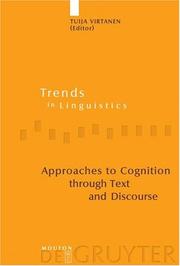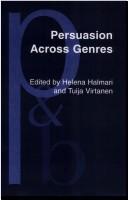| Listing 1 - 9 of 9 |
Sort by
|

ISBN: 3110177919 3110892898 9783110892895 9783110177916 Year: 2004 Volume: 147 Publisher: Berlin New York M. de Gruyter
Abstract | Keywords | Export | Availability | Bookmark
 Loading...
Loading...Choose an application
- Reference Manager
- EndNote
- RefWorks (Direct export to RefWorks)
The purpose of this book is to explore the overlapping area of study that discourse linguists and cognitive linguists are interested in. In doing so, the volume contributes to bridging the gap between these two large groups of linguists who share an interest in discourse processing but approach the area from very different perspectives and frames of reference. The starting point of this volume is text and discourse. The book includes an overview section and a number of carefully selected contributions which highlight central issues in the study of text and discourse attempting to give them cognitive explanations. In responding to the current interest in the area of discourse and cognition, the volume has adopted a wide scope which allows its individual chapters to focus on textual and situational contexts as well as the context of culture and society at large. The volume also provides its readership with a useful selection of methods used in the studies which form the basis of its chapters. The contributions, all by established linguists with highest qualifications, present new findings which have important theoretical implications. They offer unique and fresh analyses of central discourse phenomena in cognitive light and revealing discussions of the avenues opened to us at this stage of the development of the study of discourse and cognition. This accessible research volume will be essential reading for scholars and advanced students of linguistics and languages.
Psycholinguistics --- Pragmatics --- Discourse analysis --- Cognition. --- Psychology --- Psychological aspects. --- Cognition --- Psychological aspects --- Analyse du discours --- Aspect psychologique --- Discourse analysis - Psychological aspects --- cognitive sciences. --- discourse analysis.

ISBN: 9027253730 1588115887 9786612157011 1282157019 9027294747 9789027253736 9789027294746 9781588115881 9781282157019 6612157011 Year: 2005 Volume: 130 Publisher: Amsterdam Philadelphia John Benjamins Pub.
Abstract | Keywords | Export | Availability | Bookmark
 Loading...
Loading...Choose an application
- Reference Manager
- EndNote
- RefWorks (Direct export to RefWorks)
Persuasion, in its various linguistic forms, enters our lives daily. Politicians and the news media attempt to change or confirm our beliefs, while advertisers try to bend our tastes toward buying their products. Persuasion goes on in courtrooms, universities, and the business world. Persuasion pervades interpersonal relations in all social spheres, public and private. And persuasion reaches us via a large number of genres and their intricate interplay.This volume brings together nine chapters which investigate some of the typical genres of modern persuasion. Using both quantitative and qualitative methods, the authors explore the linguistic features of successful (and unsuccessful) persuasion and the reasons for the variation of persuasive choices as realized in various genres: business negotiations, judicial argumentation, political speech, advertising, newspaper editorials, and news writing. In the final chapter, the editors tie together the two themes - persuasion and genres - by proposing an Intergenre Model. This model assumes that a powerful force behind generic evolution is the perennial need for implicit persuasion.
#KVHA:Linguistiek --- #KVHA:Discourse analysis --- Discourse analysis --- Intertextuality. --- Literary form. --- Persuasion (Psychology). --- Psychological aspects. --- Persuasion (Psychology) --- Persuasion (Rhetoric) --- Analyse du discours --- Persuasion (Psychologie) --- Argumentation --- Genres littéraires --- Intertextualité --- Aspect psychologique --- Intertextuality --- Literary form --- Communication --- Conformity --- Influence (Psychology) --- Propaganda --- Psychology, Applied --- Form, Literary --- Forms, Literary --- Forms of literature --- Genre (Literature) --- Genre, Literary --- Genres, Literary --- Genres of literature --- Literary forms --- Literary genetics --- Literary genres --- Literary types (Genres) --- Literature --- Criticism --- Semiotics --- Influence (Literary, artistic, etc.) --- Psychological aspects --- Languages & Literatures --- Philology & Linguistics --- Discourse analysis - Psychological aspects
Book
ISBN: 9789027214614 9789027247056 9027214611 Year: 2024 Publisher: Philadelphia John Benjamins Publishing Company
Abstract | Keywords | Export | Availability | Bookmark
 Loading...
Loading...Choose an application
- Reference Manager
- EndNote
- RefWorks (Direct export to RefWorks)
"As a first attempt to date, this book addresses the notion of hypocrisy from a pragmatic perspective and devises a comprehensive model of verbal hypocrisy. The studies included adopt emic and etic approaches in order to contribute jointly towards an understanding of what appears to be a ubiquitous and multifaceted phenomenon. Going beyond hypocrisy as a mere moral vice, this volume establishes its pragmatic space and confronts it with adjacent notions which, unlike hypocrisy, have been subject to pragmatic examination. The Pragmatics of Hypocrisy is of interest to students and scholars in pragmatics, discourse analysis, sociolinguistics, rhetoric, communication and media studies, as well as corpus linguistics, and by its transdisciplinary nature, to researchers in philosophy, sociology, and political science. It is also essential reading for anyone interested in the interplay between language, culture and society, across varieties and registers of English."--
Pragmatics --- English language --- Hypocrisy --- Spoken English --- Discourse analysis
Book
ISBN: 9027247056 Year: 2024 Publisher: Amsterdam/Philadelphia John Benjamins Publishing Company
Abstract | Keywords | Export | Availability | Bookmark
 Loading...
Loading...Choose an application
- Reference Manager
- EndNote
- RefWorks (Direct export to RefWorks)
"As a first attempt to date, this book addresses the notion of hypocrisy from a pragmatic perspective and devises a comprehensive model of verbal hypocrisy. The studies included adopt emic and etic approaches in order to contribute jointly towards an understanding of what appears to be a ubiquitous and multifaceted phenomenon. Going beyond hypocrisy as a mere moral vice, this volume establishes its pragmatic space and confronts it with adjacent notions which, unlike hypocrisy, have been subject to pragmatic examination. The Pragmatics of Hypocrisy is of interest to students and scholars in pragmatics, discourse analysis, sociolinguistics, rhetoric, communication and media studies, as well as corpus linguistics, and by its transdisciplinary nature, to researchers in philosophy, sociology, and political science. It is also essential reading for anyone interested in the interplay between language, culture and society, across varieties and registers of English"--
English language --- Hypocrisy. --- Pragmatics. --- Spoken English.
Multi
ISBN: 9529616201 9789529616206 Year: 1992 Publisher: Åbo Åbo akademis förlag
Abstract | Keywords | Export | Availability | Bookmark
 Loading...
Loading...Choose an application
- Reference Manager
- EndNote
- RefWorks (Direct export to RefWorks)
English language --- Grammar --- Pragmatics --- 802.0-56 --- Engels: syntaxis; semantiek --- Theses --- 802.0-56 Engels: syntaxis; semantiek
Book

ISBN: 9789027254344 Year: 2009 Volume: 190 Publisher: Amsterdam Benjamins
Abstract | Keywords | Export | Availability | Bookmark
 Loading...
Loading...Choose an application
- Reference Manager
- EndNote
- RefWorks (Direct export to RefWorks)
English literature --- Pragmatics --- Literature --- Literature and philosophy --- Philosophy and literature --- Belles-lettres --- Western literature (Western countries) --- World literature --- Philology --- Authors --- Authorship --- History and criticism --- History and criticism&delete& --- Theory, etc --- Philosophy --- Theory --- Literature History and criticism --- Theory, etc.
Book

ISBN: 1282425900 9786612425905 3111737373 3110213885 3110207338 9783110213881 Year: 2009 Publisher: Berlin Boston
Abstract | Keywords | Export | Availability | Bookmark
 Loading...
Loading...Choose an application
- Reference Manager
- EndNote
- RefWorks (Direct export to RefWorks)
In vielen Bereichen der Linguistik werden Textkorpora, Sprachkorpora oder multimodale Korpora heute als empirische Basis verwendet. Aufbauend auf Methoden des 19. Jahrhunderts haben sich dabei mit dem Aufkommen von elektronischen Korpora seit den 1940ern neue Standards für linguistische Annotation und Vorverarbeitung sowie für qualitative und quantitative Untersuchungen entwickelt.Das Handbuch bietet einen umfassenden Überblick über Geschichte, Methoden und Anwendungen der Korpuslinguistik. Die einzelnen Überblicks- und Spezialartikel sind von Experten und Expertinnen der jeweiligen Gebiete geschrieben. Dabei wird auf klare und umfassende Darstellung, eine gute Vernetzung zwischen den Artikel und weiterführende Hinweise Wert gelegt. This handbook provides an up-to-date survey of the field of corpus linguistics, a field whose methodology has revolutionized much of the empirical work done in most fields of linguistic study over the past decade. Corpus linguistics investigates human language by starting out from large collections of texts - spoken, written, or recorded. These language corpora, which are now regularly available in electronic form, are the basis for quantitative and qualitative research on almost any question of linguistic interest. Many techniques that are in use in corpus linguistics today are rooted in the tradition of the late 18th and 19th century, when linguistics began to make use of mathematical and empirical methods. Modern corpus linguistics has used and developed these methods in close connection with computer science and computational linguistics. The handbook sketches the history of corpus linguistics, shows its potential, discusses its problems, and describes various methods of collecting, annotating, and searching corpora as well as processing corpus data. It also reports case studies that illustrate the wide range of linguistic research questions addressed in corpus linguistics. The over 60 articles included in the handbook are divided into five sections:(1) the origins and history of corpus linguistics and surveys of its relationship to central fields of linguistics (2) corpus compilation (3) corpus types (4) preprocessing of corpora (5) the use and exploitation of corpora. The final section gives an overview of the results of corpus studies obtained in phonetics, phonology, morphology, syntax, semantics, sociolinguistics, historical linguistics, stylometry, dialectology, and discourse analysis. It also reports on recent advances made in human and machine translation, contrastive studies, computer-assisted language learning, and automatic summarization. The contributors to the volume are internationally known experts in their respective fields. The handbook is intended for a wide audience ranging from teachers, university students, and scholars to anyone interested in the use of computers in linguistic analyses and applications.
Computational linguistics. --- Corpora (Linguistics). --- Corpora (Linguistics) --- Computational linguistics --- Languages & Literatures --- Philology & Linguistics --- Automatic language processing --- Language and languages --- Language data processing --- Linguistics --- Natural language processing (Linguistics) --- Corpus-based analysis (Linguistics) --- Corpus linguistics --- Data processing --- Applied linguistics --- Cross-language information retrieval --- Mathematical linguistics --- Multilingual computing --- Linguistic analysis (Linguistics) --- Corpus linguistics, Computational linguistics.
Book

ISBN: 9783110811933 Year: 2011 Publisher: Berlin Boston
Abstract | Keywords | Export | Availability | Bookmark
 Loading...
Loading...Choose an application
- Reference Manager
- EndNote
- RefWorks (Direct export to RefWorks)
Book

ISBN: 9783110214451 3110214458 9783110214468 3110214466 Year: 2013 Volume: 9 Publisher: Berlin Boston
Abstract | Keywords | Export | Availability | Bookmark
 Loading...
Loading...Choose an application
- Reference Manager
- EndNote
- RefWorks (Direct export to RefWorks)
The present handbook provides an overview of the pragmatics of language and language use mediated by digital technologies. Computer-mediated communication (CMC) is defined to include text-based interactive communication via the Internet, websites and other multimodal formats, and mobile communication. In addition to 'core' pragmatic and discourse-pragmatic phenomena the chapters cover pragmatically-focused research on types of CMC and pragmatic approaches to characteristic CMC phenomena.
Communication --- Pragmatics --- Data processing --- Pragmatiek --- Computergerelateerde communicatie --- e-mails --- Blogs --- Chat --- Sms --- Data processing. --- Communication -- Data processing. --- Pragmatics -- Data processing. --- Pragmatics. --- Telematics -- Social aspects. --- Journalism & Communications --- Communication & Mass Media --- Computergerelateerde communicatie. --- e-mails. --- Blogs. --- Chat. --- Sms. --- Pragmalinguistics --- General semantics --- Language and languages --- Logic, Symbolic and mathematical --- Semantics (Philosophy) --- Philosophy --- Communication - Data processing --- Pragmatics - Data processing --- E-mails. --- Applied Linguistics, Computer-mediated Communication, Pragmatics.
| Listing 1 - 9 of 9 |
Sort by
|

 Search
Search Feedback
Feedback About UniCat
About UniCat  Help
Help News
News